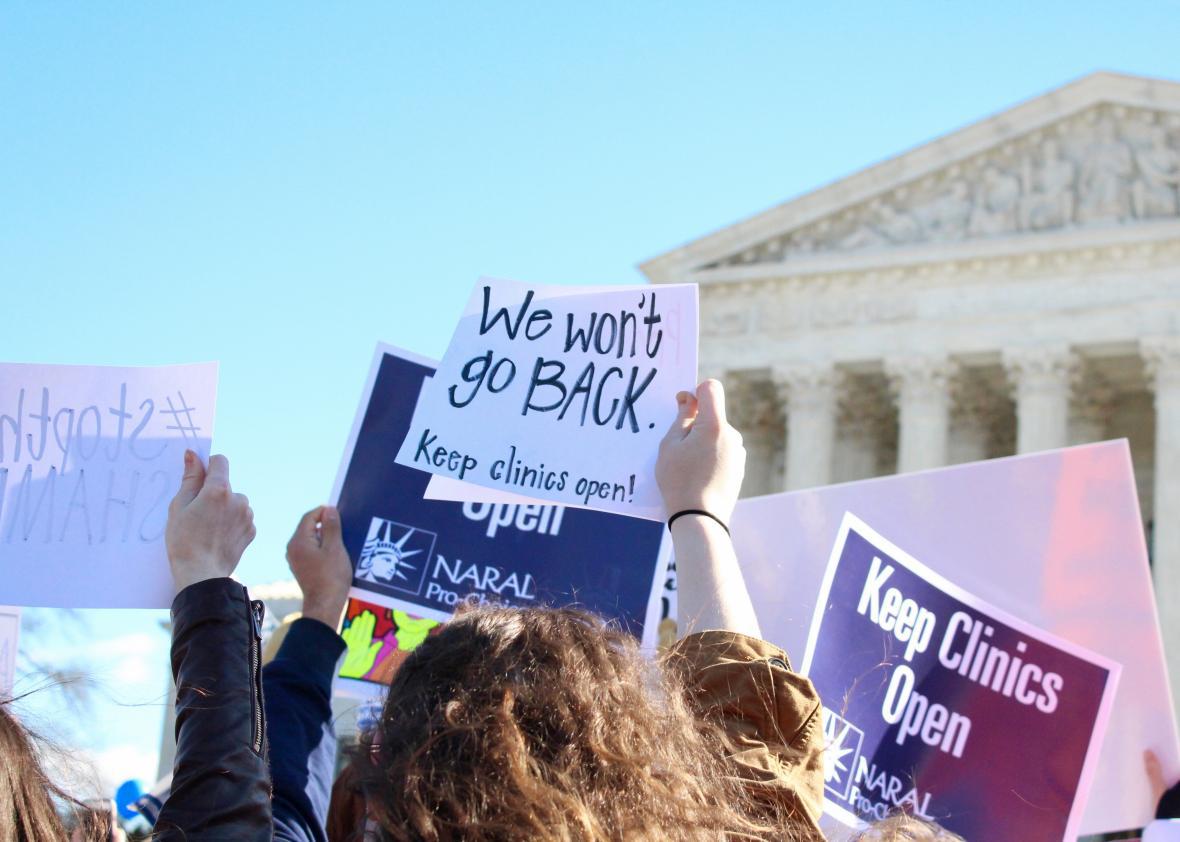“Welcome to the Supreme Court on the day when we must be here to bear witness to the truth,” said Frank Pavone, national director of Priests for Life, outside the court on Wednesday morning. Inside, the justices were preparing to hear oral arguments in the most significant abortion case in decades. Outside, Pavone and his microphone were surrounded by a few dozen blue-clad anti-choice activists, arms locked together, protecting him.
Their chain marked a blurry, cacophonous boundary between the small group of pro-lifers and a couple thousand pro-choice ralliers wearing purple, who cheered for speeches from reproductive justice advocates—including Amy Hagstrom Miller, the head of plaintiff organization Whole Woman’s Health—on a stage at the Supreme Court steps.
Kierra Johnson, executive director of Unite for Reproductive and Gender Equity, worked the crowd with an address built around the hottest single dropped so far this year. “Has anyone heard the song—you might not have heard it—‘Formation,’ by Beyoncé?” Johnson said to screams from the crowd. “‘Formation’ is a call to and for the unseen, the silenced, the belittled.” She laid out a litany of demands the reproductive justice movement must make of political leaders: repealing the Hyde Amendment, ending laws that require parental notification for abortion, and instating nationwide comprehensive sex education. “This is just the beginning. But first, we must get in formation,” Johnson said. As for Queen Bey: “Next time, her ass will be here too.”
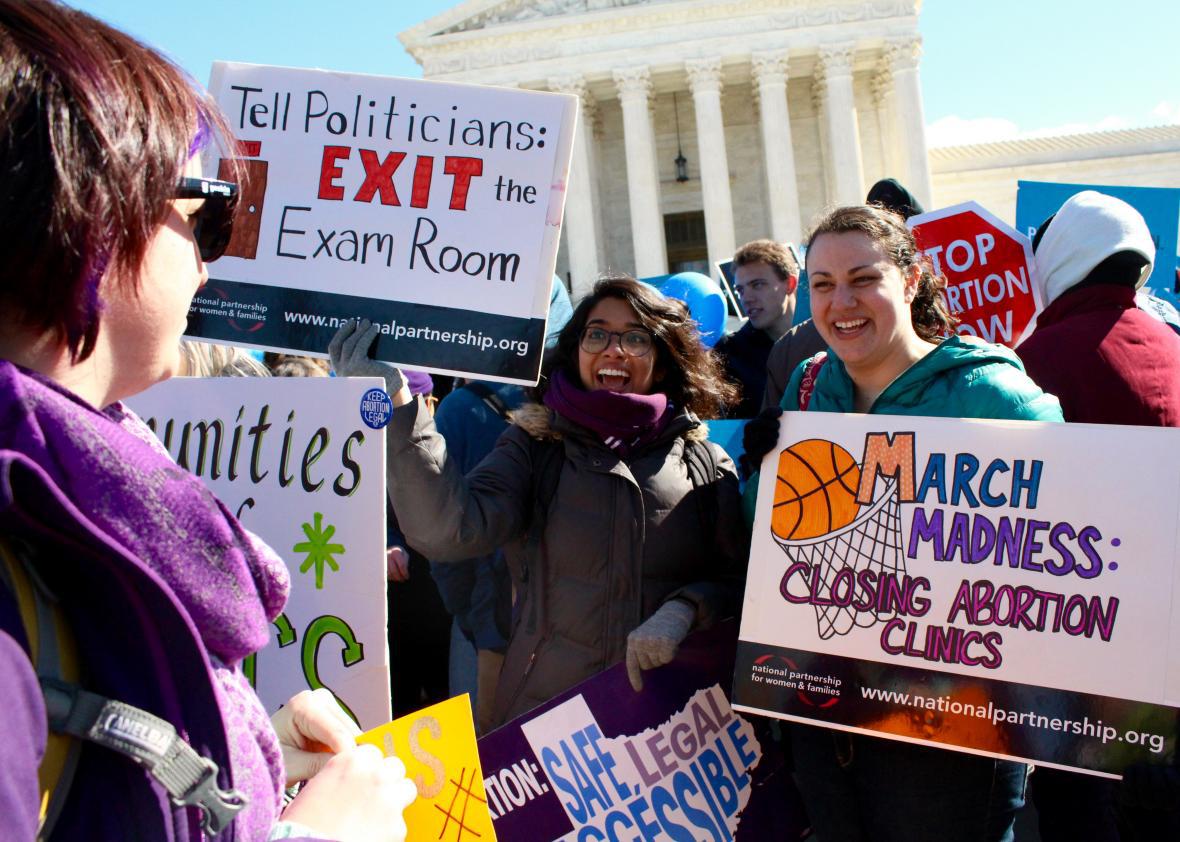
Christina Cauterucci/Slate
With election season approaching, the political implications of the case hung heavy on the crowd. Johnson shouted out Rep. Carolyn Maloney (D-NY), who stood in the audience; a sizable delegation from the campaign team of Rep. Chris Van Hollen (D-MD), who’s running for Barbara Mikulski’s senate seat in Maryland, represented their candidate in branded T-shirts and backpacks.
Women of color led the bill on the reproductive justice stage, and for good reason. “This law is shutting black women and women of color out,” La’Tasha D. Mayes, executive director of New Voices for Reproductive Justice, said in her address. “Every single bill, every single billboard, every single piece of legislation disproportionately affects black women.” OB/GYN abortion providers spoke about the challenges they face in providing adequate care and meeting the needs of their communities while clinics close around the country. Sonya Renee Taylor of The Body is Not An Apology told her story of having an abortion, decrying the notion that there can be a right or wrong reason to terminate a pregnancy. “I do not owe the Texas legislature, the anti-choice fearmongers, or even the Supreme Court of the United States any explanation. The simple fact is: It is not their business,” she said. “Stop wasting our time with these sham laws and go get your cousin.” The crowd yelled it back to her, chanting “go get your cousin”—that is, if anti-choice politicians want to bring in someone bigger to fight their fight, the movement’s ready.
In the pro-life corner, activists sang hymns as Pavone assured the crowd that “the right to life will prevail,” even despite the death of one of their “friends on the court,” Antonin Scalia. A woman who’d once had an abortion took the mic to say that she now suffers from depression and regrets having the procedure. “Abortion is not good for women,” she said. “Thank your mothers,” a male speaker advised.
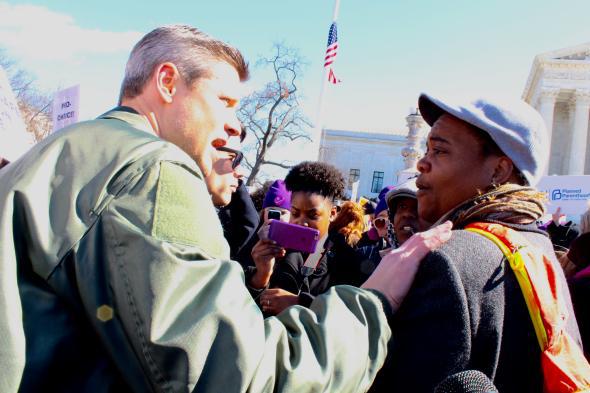
Christina Cauterucci/Slate
At the margins of the anti-choice contingent, pairs and small groups argued over abortion rights. Two men on the blue side and two women in purple got into a shouting match that escalated when one of the men touched one of the women. “Frederick Douglass was the result of a rape and he changed the world,” the man said. “So that settles that rape issue.” The woman countered that unwanted children born to poor mothers without access to contraception or abortion were more likely to end up dead or incarcerated. “Once they’re born, you don’t care,” she said.
Lex Gibson, a 30-year-old from Charlottesville, Virginia, stood at the border of the anti-choice group’s human chain, popping their blue balloons. This was her first rally for reproductive rights. “They’re using arbitrary building codes to repeal our rights,” she said. “I never thought I’d have to fight for this in my lifetime. I thought my mother established this for us. I thought all the other [older] women here already established this for us.” Gibson feels confident that the Supreme Court would strike down Texas’ HB2 law, in part because the reproductive justice movement was attracting more people than the pro-life movement. “We have reality, facts, medicine, and science on our side. All they have is fictitious beliefs,” she said. If the Supreme Court upholds HB2, “there won’t be fewer abortions. All there will be is injured women and dead women.”
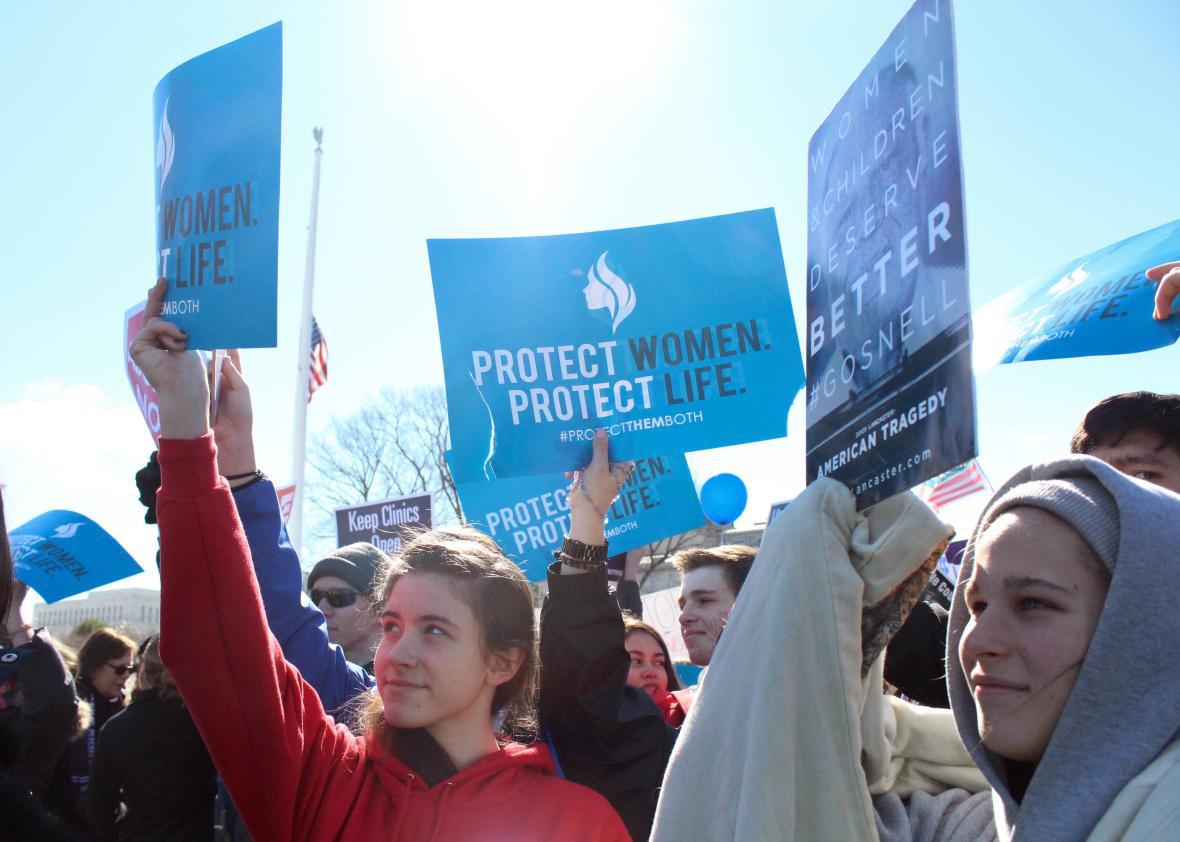
Christina Cauterucci/Slate
Inside the pro-lifer bubble, Julie Hill, 14, stood with her mom. “We have a tight group of friends, and we’ve all been raised Catholic,” Hill said. “All our families are large families, and ever since we were kids, we’ve been trying to support life as much as we can, because there’s so little respect for it.” Hill’s mother said it was important to teach her daughter about the pro-life movement “for her own personal dignity. “I’ve been at this for a long time. I was here 40 years ago, and every year since then,” she said. “But when I was in high school, I didn’t realize how dramatically this [issue] was going to change America.” She’s taken Hill to several Marches for Life and clinic protests. “A lot of people say they’re pro-abortion, but they couldn’t have even been here without being born, so it doesn’t really make sense to me,” Hill said. “Children can’t speak for themselves. You’re killing someone who could grow up to be a very successful man.”
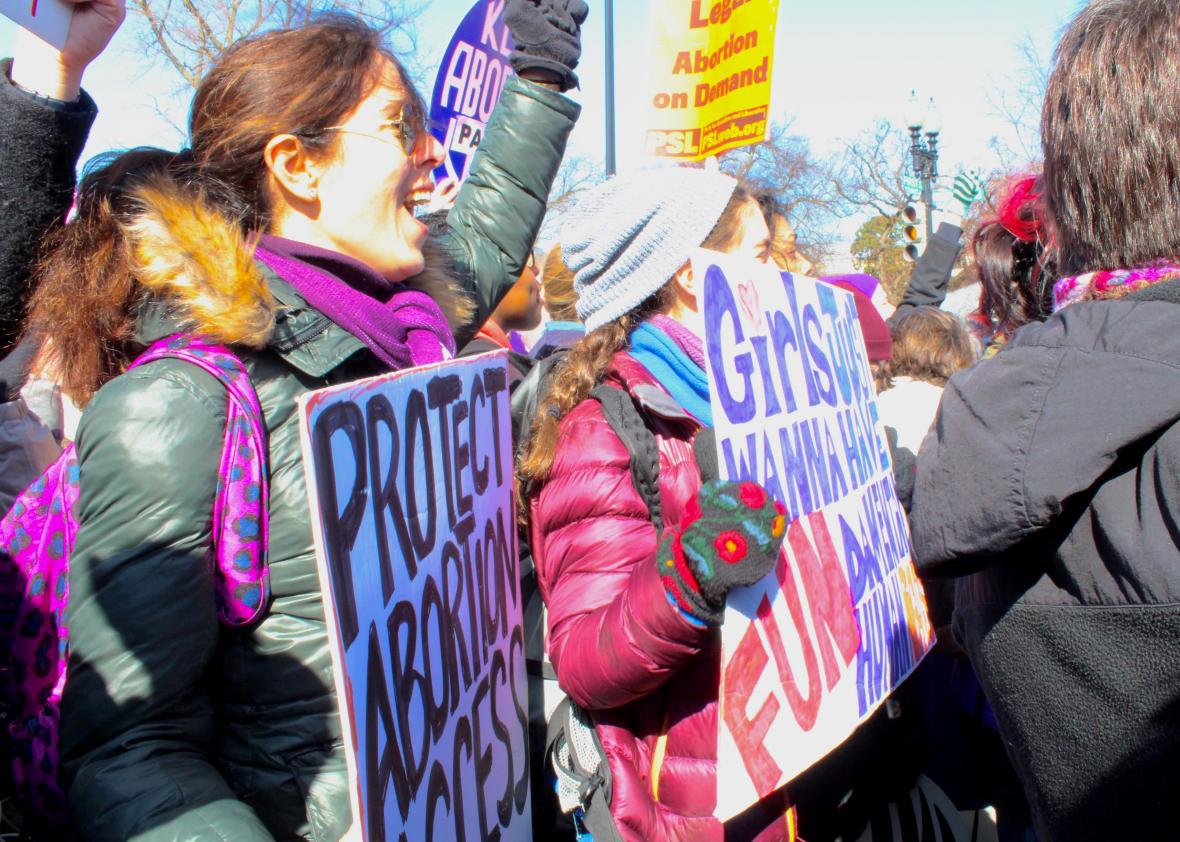
Christina Cauterucci/Slate
A few yards away, on the other side of the human chain, Samara Haynes, 12, held a poster that read “My mom was at this rally when she was 12, but all I got was this sham law.” (Reproductive justice advocates have been using the catchphrase “Stop the Sham” to sum up their argument.) Haynes and her mother, Magda Schaler-Haynes, traveled to the rally from Montclair, New Jersey. “I’m teaching her to fight this fight, but hopefully she won’t need to know how,” Schaler-Haynes said. Her mother had pulled her out of school to go a reproductive-rights rally in the ‘80s, she said, and in her mother’s memory, Schaler-Haynes took her daughter out of school to attend Wednesday’s landmark event. Haynes’ grandmother from the other side of her family was at the HB2 rally, too; she remarked that they represented three generations of women advocating for abortion rights. I asked Schaler-Haynes when she started teaching her daughter about reproductive justice. “Oh,” she shrugged, “when she was a fetus, I guess.”
